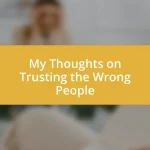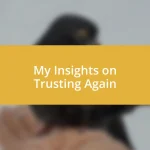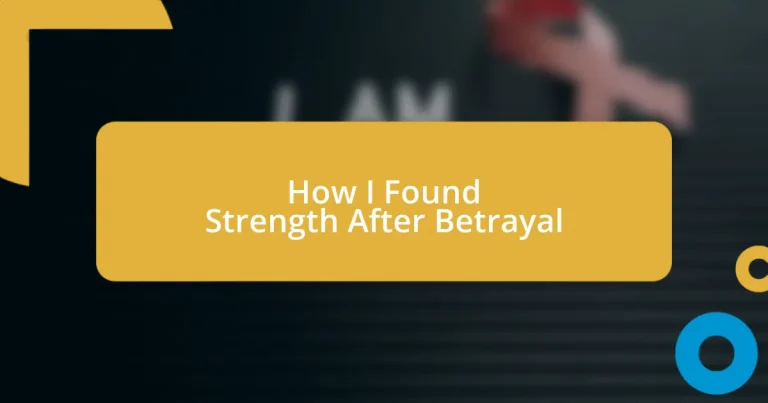Key takeaways:
- Betrayal triggers a complex emotional response similar to grief, requiring acknowledgment of feelings like shock, anger, and sadness for healing.
- Building a supportive network of empathetic friends and support groups is vital for recovery, while maintaining healthy boundaries can protect mental health.
- Finding meaning in betrayal through introspection and giving back to others can transform pain into personal growth and empowerment.
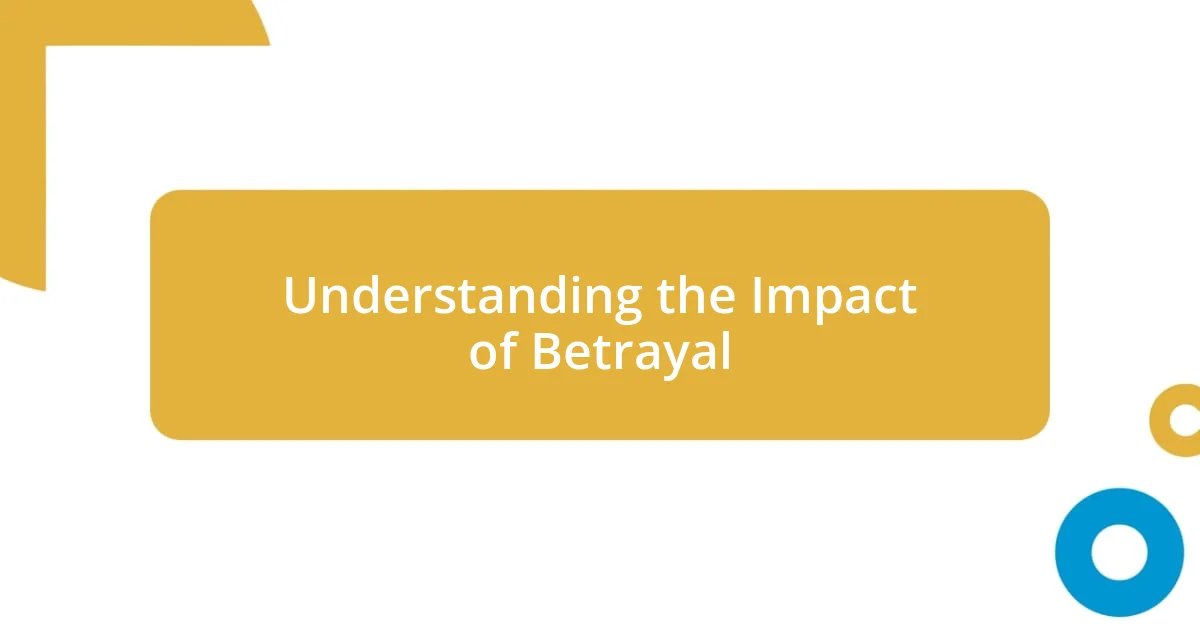
Understanding the Impact of Betrayal
Betrayal can shake our foundations, leaving us grappling with feelings we didn’t even know existed. I remember the day I discovered my closest friend had shared my secrets. It felt like a punch in the gut, leaving me confused and raw. In those moments, I questioned everything—was our friendship built on lies, or had I misread the signs all along?
The emotional fallout from betrayal often parallels the stages of grief. Initially, there’s shock and denial, followed by anger and sadness. I vividly recall cycling through these emotions like a relentless wave, feeling both lost and empowered in my turbulent state. It begs the question: how can someone we trust turn into a source of our greatest pain?
Understanding the impact of betrayal forces us to confront our vulnerabilities. For me, it highlighted my need for connection and acceptance—a double-edged sword that made me more cautious yet ultimately deeper in my relationships. Can the hurt from betrayal become a catalyst for personal growth? I believe that, through reflection and resilience, it absolutely can.
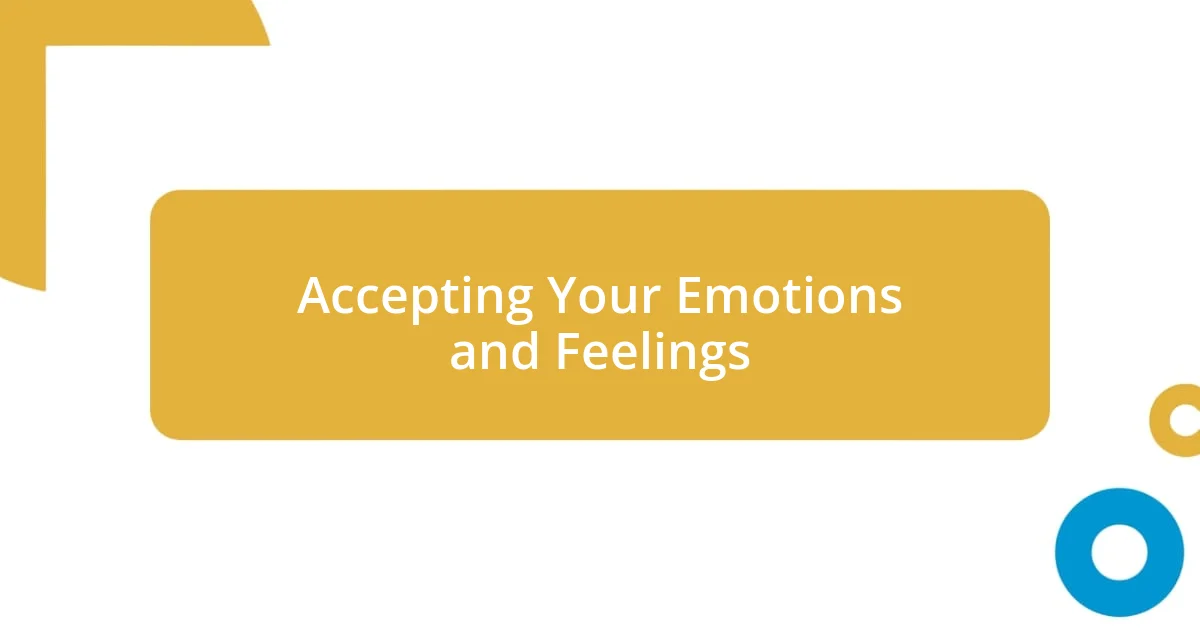
Accepting Your Emotions and Feelings
Accepting your emotions is a crucial part of healing. When I faced betrayal, I found myself overwhelmed by a whirlwind of feelings that shifted like quicksand beneath me. It was liberating to finally name my emotions—fear, anger, sadness—even if those names felt heavy. Instead of brushing them aside, I learned to embrace them, allowing them to exist without judgment.
Here are some feelings to acknowledge when grappling with betrayal:
- Shock: A sudden wave of disbelief that may leave you numb.
- Frustration: Anger towards the person who betrayed you and towards yourself for trusting them.
- Sadness: A profound sense of loss for the relationship you once had.
- Loneliness: Feeling isolated in your pain, as if no one can truly understand what you’re going through.
- Empowerment: Recognizing that, despite the betrayal, you can reclaim your narrative and grow from this experience.
Navigating these emotions isn’t just about acceptance; it’s about fostering resilience. In my journey, I discovered how facing each feeling head-on, rather than running from them, gave me strength I didn’t know I had. I remember crying one evening, feeling the weight of each tear as a release, and in that catharsis, I began to feel lighter, as if I was shedding the betrayal itself.
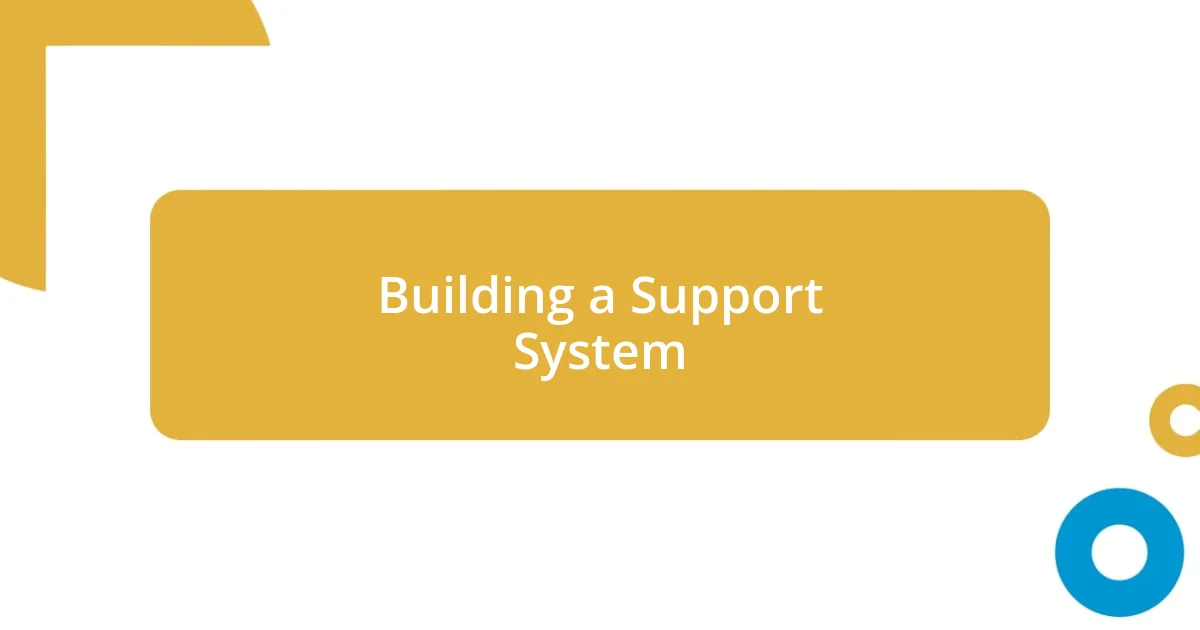
Building a Support System
Building a support system after experiencing betrayal can transform your healing journey. I vividly recall reaching out to an old friend who had been there for me during tough times. Their unwavering support became my lifeline, showing me the importance of surrounding myself with empathetic people who understand my pain. The moment I shared my story, I felt a weight lift, as if I was no longer alone in facing the shadows of betrayal.
Friends and family can provide comfort, but it’s also valuable to seek out those who have experienced similar betrayals. I remember joining an online support group where strangers became confidants, sharing their battles and victories. We offered each other honest feedback, reminding one another that healing doesn’t follow a straight path. This connection gave me hope and encouraged me to embrace my own journey, knowing that recovery is possible.
It’s also essential to recognize that not every relationship is worth maintaining during difficult times. I had to make the tough decision to distance myself from certain individuals who didn’t support my healing process. My experience taught me that building a solid support system means curating relationships that uplift rather than drain me. As I learned to surround myself with positivity, I began nurturing a life filled with genuine love and understanding.
| Support System Elements | Importance |
|---|---|
| Empathetic Friends | Provide emotional comfort and understanding |
| Support Groups | Offer shared experiences and hope |
| Nurturing Relationships | Encourage personal growth and healing |
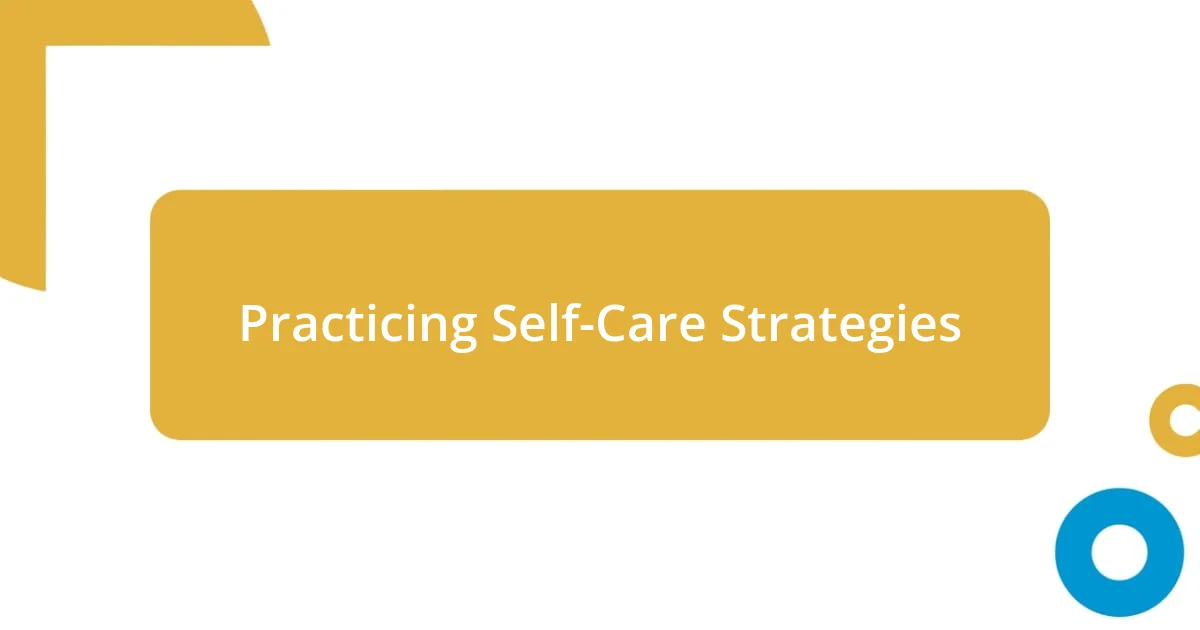
Practicing Self-Care Strategies
Practicing self-care strategies can be a powerful tool for healing after betrayal. One of my favorite practices became creating a daily routine that filled me with purpose. I started each morning with a cup of tea, taking a moment to appreciate the warmth and aroma. That small ritual grounded me and reminded me that, despite the chaos around me, I could carve out snippets of peace.
As I navigated my tumultuous emotions, I also discovered the importance of physical activity. I remember lacing up my sneakers and heading out for a brisk walk, the fresh air hitting my face like a refreshing embrace. With every step, I felt my frustrations dissipate, and I questioned, “How often do we forget the power of movement in our healing?” It was a humbling realization that moving my body not only lifted my mood but also stirred my spirit to release the burdens I was carrying.
I also found value in creative expression, which allowed me to channel my emotions into something tangible. One day, I picked up a paintbrush, feeling the urge to splash color onto the canvas. I was hesitant at first—what if I wasn’t good enough? But, as I let the colors flow, I felt liberated. That experience made me wonder: Aren’t we all artists in our journeys, capable of creating beauty even from our pain? Engaging in creative activities reminded me that healing is not just about recovery; it’s about transforming hurt into something meaningful.
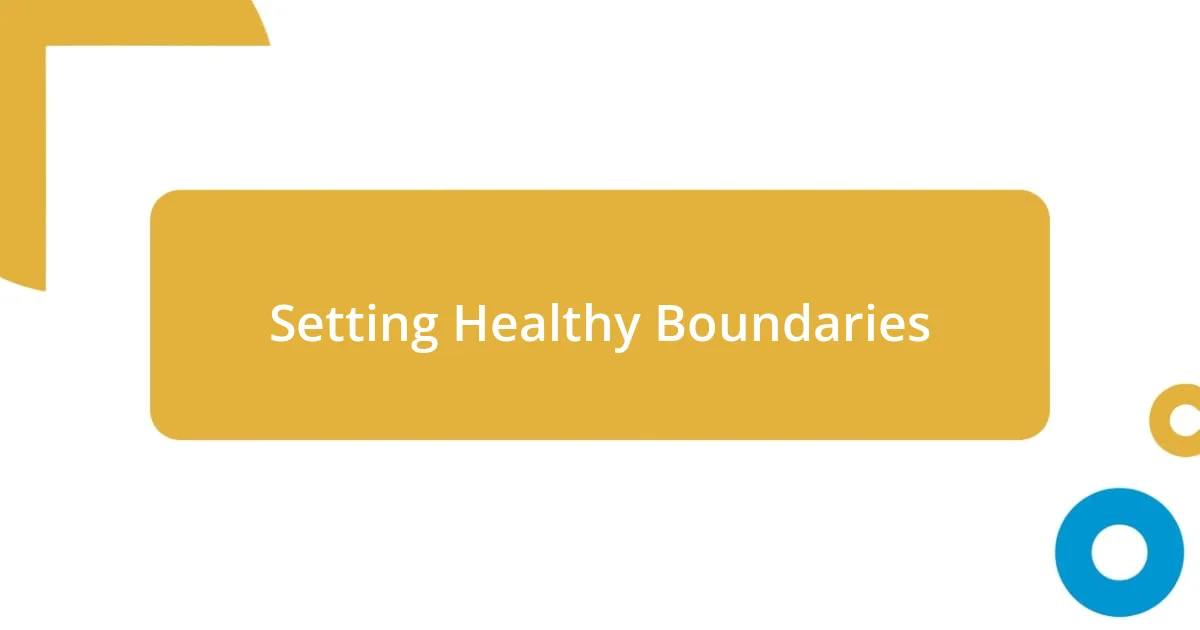
Setting Healthy Boundaries
Setting healthy boundaries is an essential step in reclaiming your power after betrayal. I remember distinctly one evening when I decided to cut off contact with someone who consistently dismissed my feelings. It felt liberating, almost like shedding a heavy cloak that had weighed me down for far too long. Have you ever felt that sense of lightness when you finally stand up for yourself?
When I began communicating my limits clearly, I noticed immediate changes in the dynamics around me. For instance, I told a family member that I needed space to process my emotions before discussing certain topics. It wasn’t easy at first, but establishing that boundary helped me protect my mental health. It’s incredible how articulating your needs can create a healthier environment, isn’t it?
Over time, I recognized that maintaining boundaries is not just about saying “no.” It’s about embracing self-respect and prioritizing well-being. There were days when I felt guilty for setting limits, questioning whether I was being too harsh. But then, I reminded myself that healthy relationships thrive on respect and understanding. I encourage you to reflect: Are your boundaries serving you or draining you? Setting healthy boundaries is not just a protective measure; it’s a profound act of self-love and clarity in the tumultuous journey post-betrayal.
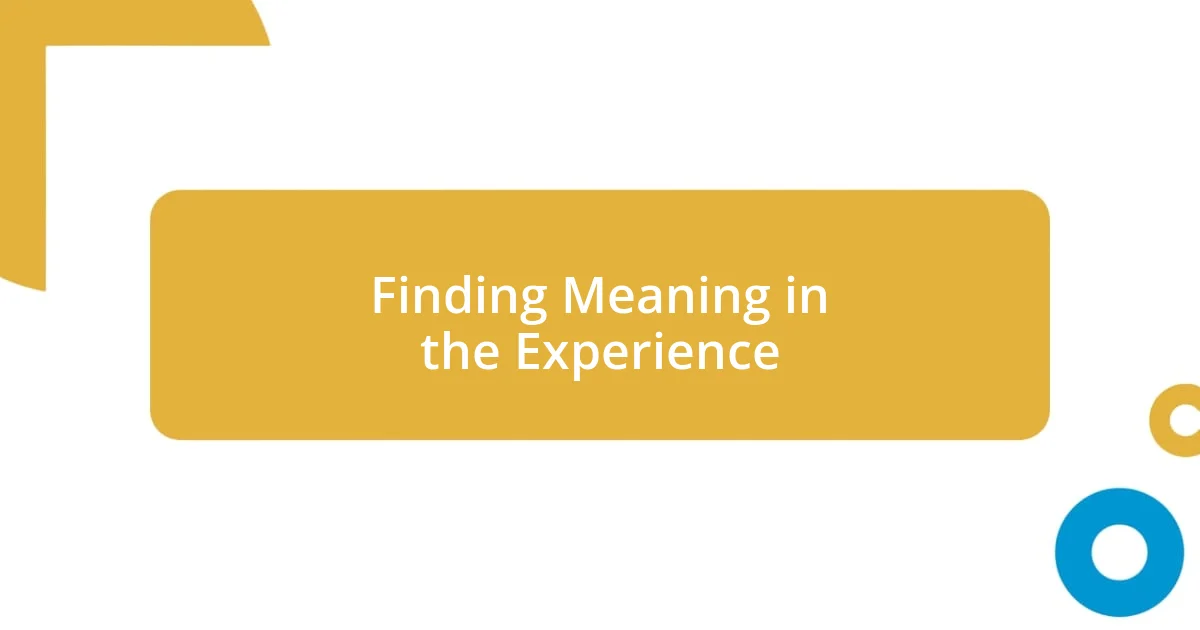
Finding Meaning in the Experience
Finding meaning in the experience of betrayal often begins with introspection. I vividly recall a rainy afternoon when I sat by my window, reflecting on the painful moments. It struck me then that every tear I shed was a lesson urging me to reassess my values and relationships. Have you ever paused to consider how even the hardest experiences can reshape our understanding of what truly matters to us?
As I journeyed deeper into my healing, I discovered that examining the betrayal could unveil hidden strengths. I remember pondering why I had trusted that person in the first place. This wasn’t just about them being untrustworthy; it was also an illumination of my strengths—my capacity for love and loyalty. The more I understood this, the more empowered I felt. Isn’t it powerful to realize that even in our vulnerabilities, we hold remarkable resilience?
Lastly, I found meaning by channeling my insights into action. I started volunteering at a local shelter, partly to distract myself but ultimately to give back to the community. Each encounter reinforced the idea that my pain could fuel compassion, helping me connect with others who were also healing. Have you ever noticed how reaching out to help others can amplify your own sense of purpose? It became clear to me that finding meaning in my experience wasn’t just about moving forward; it was about transforming pain into a force for good.
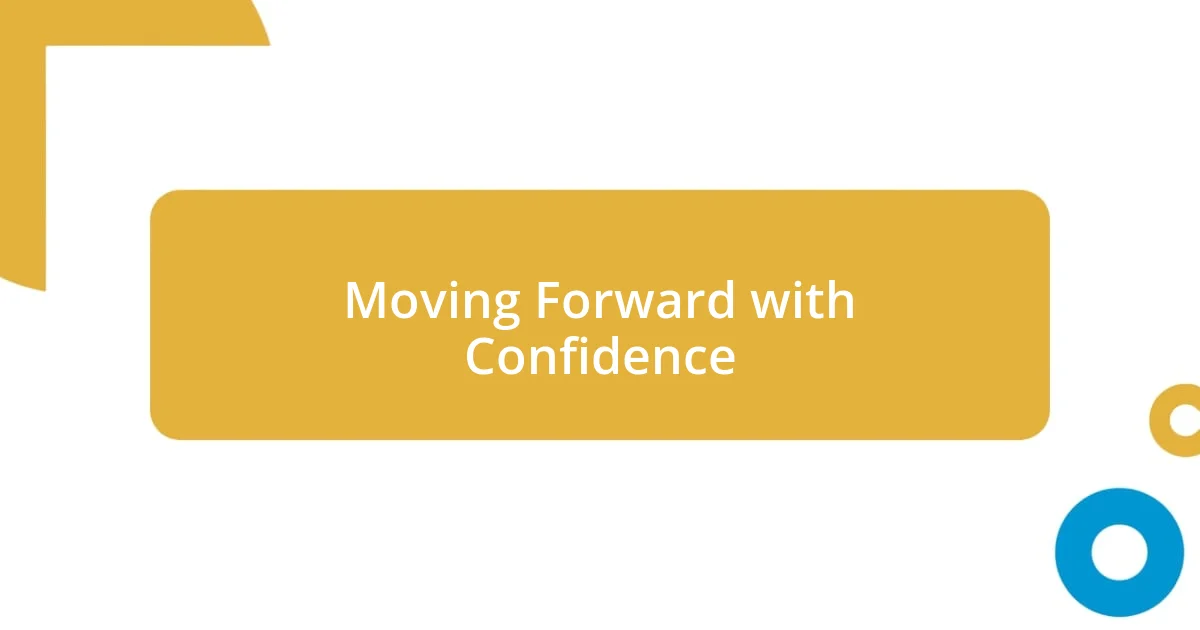
Moving Forward with Confidence
Moving forward with confidence often means embracing the lessons learned from betrayal rather than letting them anchor you in self-doubt. I recall a moment when I stepped onto a stage for a presentation, my heart pounding. That day, I refused to let the fear of past disappointments hold me back. I had decided that my voice mattered, and that decision transformed how I perceived challenges. Don’t you think it’s empowering to realize you can turn past pain into a catalyst for growth?
In reconnecting with my self-worth, I started celebrating even the small victories—like completing a project I’m passionate about or speaking my truth in conversations. These achievements became the building blocks for my confidence. I often asked myself, “What small step can I take today that aligns with my strengths?” I found that by consistently reaffirming my abilities, I could cultivate an unshakeable belief in myself. Have you tried recognizing your own small wins lately?
As I moved through this process, I learned the importance of surrounding myself with positive influences. I began spending more time with individuals who uplifted me and believed in my potential. I vividly remember a conversation with a friend who reminded me of my resilience, saying, “You’ve faced adversity before, and look at how far you’ve come!” That reassurance was a game-changer. It highlighted the profound impact our support systems can have when we strive to move forward with confidence. What voices do you let into your life—are they lifting you higher or dragging you down?







